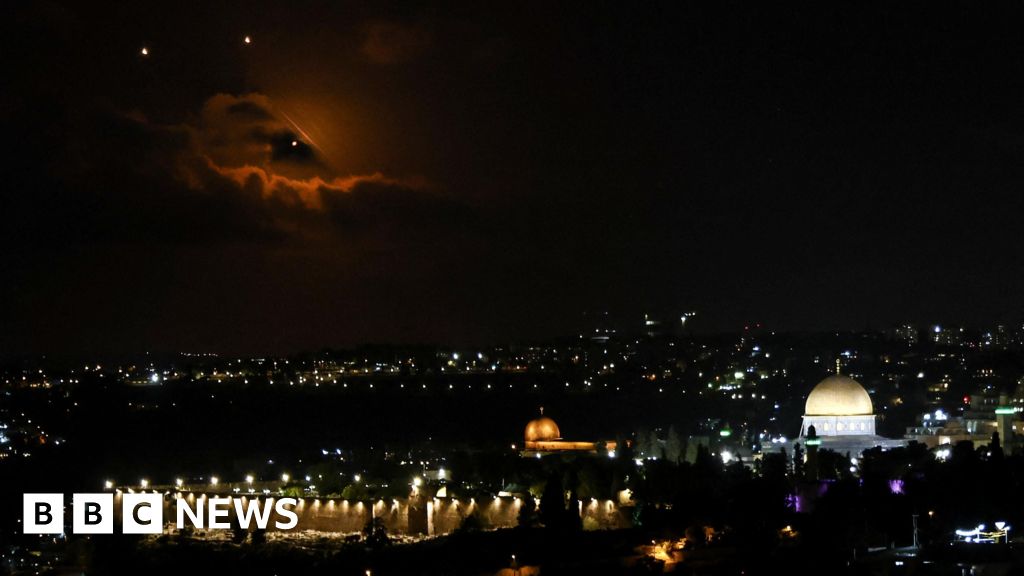Escalating Tensions: Iran’s Missile Attack on Israel
In a dramatic escalation of hostilities in the Middle East, Iran has launched a significant missile attack on Israel, firing approximately 180 missiles towards the nation. This assault marks the second major offensive by Iran this year, following a similar barrage in April that involved around 140 missiles and drones. The recent attack has raised alarms not only in Israel but also among its allies, as the region braces for potential further conflict.
The Scale of the Attack
The missile strike occurred on a Tuesday evening, with footage broadcasted by Israeli television showing missiles soaring over the Tel Aviv area shortly before 19:45 local time (16:45 GMT). Israeli military officials reported that most of the missiles were intercepted by the country’s advanced aerial defense systems, notably the Iron Dome. However, some missiles reportedly struck military bases, restaurants, and schools, leading to concerns about civilian safety and infrastructure damage.
Iran’s Islamic Revolutionary Guard Corps (IRGC) claimed that 90% of the projectiles successfully hit their intended targets, asserting that hypersonic missiles were utilized for the first time in this attack. Tragically, the Palestinian civil defense authority reported that a man in Jericho was killed by falling debris from the missiles, underscoring the collateral damage of such military actions.
Motivations Behind the Attack
The IRGC stated that the missile barrage was a direct response to Israel’s recent actions, particularly the assassination of key Iranian military figures, including the killing of Hezbollah leader Hassan Nasrallah and IRGC commander Abbas Nilforoshan in Beirut on September 27. Additionally, the IRGC referenced the death of Hamas political leader Ismail Haniyeh in Tehran in July, which, although not officially acknowledged by Israel, is widely believed to have been orchestrated by Israeli forces.
Iran’s longstanding animosity towards Israel is rooted in its refusal to recognize the nation’s right to exist. Over the years, Iran has supported various paramilitary organizations that oppose Israel, further complicating the geopolitical landscape of the region.
Israel’s Defense Mechanisms
Israel’s defense capabilities are among the most advanced in the world, with the Iron Dome being the most recognized system designed to intercept short-range rockets. However, the recent attack showcased the effectiveness of Israel’s layered defense strategy, which includes systems like David’s Sling for medium to long-range threats and the Arrow 2 and Arrow 3 interceptors for long-range ballistic missiles.
While the Iron Dome played a crucial role in intercepting incoming threats, other defense systems likely contributed significantly to mitigating the impact of the missile barrage. The successful interception of many missiles prevented what could have been a catastrophic situation for Israeli civilians.
International Reactions
The missile attack has drawn swift condemnation and support for Israel from its allies. U.S. President Joe Biden reaffirmed American support, describing the Iranian missile assault as "defeated and ineffective." He ordered U.S. forces in the region to assist in Israel’s defense, leading to U.S. Navy destroyers firing interceptors against incoming Iranian missiles.
The Pentagon confirmed that U.S. forces successfully intercepted multiple missiles, with Defense Secretary Lloyd Austin condemning Iran’s actions as an "outrageous act of aggression." Reports indicated that UK fighter jets were also involved in supporting Israel, with British officials emphasizing their commitment to Israel’s right to self-defense.
France and Japan joined the chorus of condemnation against Iran, urging all parties to de-escalate tensions and avoid further conflict.
What Lies Ahead?
In the aftermath of the missile attack, Israeli Prime Minister Benjamin Netanyahu warned that Iran had made a "big mistake" and would face consequences. Israeli military officials have indicated that they have plans in place to respond at a time and place of their choosing. Meanwhile, the IRGC has threatened a "more crushing and ruinous" response if Israel retaliates.
As tensions continue to simmer, the Israeli military has already conducted airstrikes in Beirut targeting Hezbollah positions, further escalating the conflict. The situation remains fluid, with the potential for further military actions and retaliations looming on the horizon.
Conclusion
The recent missile attack by Iran on Israel highlights the fragile and volatile nature of Middle Eastern geopolitics. As both nations brace for potential retaliation and further conflict, the international community watches closely, hoping for a resolution that can prevent further escalation and protect civilian lives. The stakes are high, and the consequences of continued hostilities could reverberate far beyond the region.
